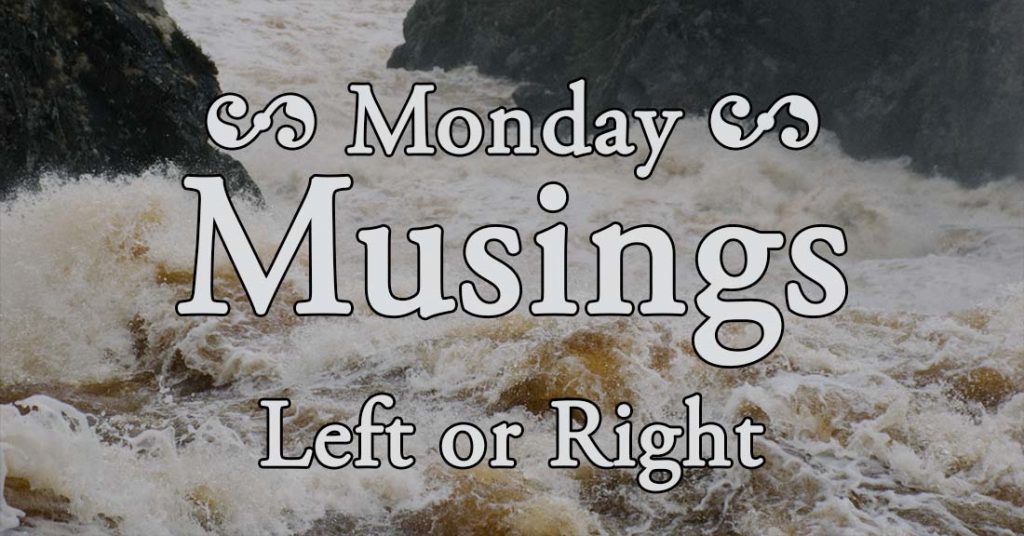Share This Musing
“It’s been 72 hours since I have spoken to my mom.”
The photos the scared daughter included with that heartbreaking post this week showed a smiling woman, someone who could laugh heartily and embrace family and friends in a hug. Judy spent her summers in a campground nestled in a sharp bend of the East Fork of the Pigeon River in the small community of Cruso. As flood waters spilled out of the banks Tuesday, she drove over the bridge that served as the only exit. No one saw which way she turned when she reached the main road.
Left or right?
Haywood County sits at a higher elevation than its neighbors, so no body of water flows into the county—only out. The Pigeon starts just a few miles outside Cruso, high up in the rugged mountains of the Shining Rock Wilderness.
The tropical weather that comes in off the Gulf or Atlantic will often ride the mountains, dropping heavy rains and causing flooding and mudslides. Back in 2004, back-to-back Hurricanes Frances and Ivan forced the Pigeon River out of its banks, destroying homes and businesses. So even though Fred was only a single tropical storm, county emergency services were on high alert. Swift water rescue teams moved into positions. School buses rolled, taking kids to the safety of their homes. All eyes focused on the sensors monitoring water levels. When the river rose by a foot in a mere fifteen minutes, the emergency team issued alerts.
Telephones screeched. Televisions and radio stations interrupted their programming. Blunt language warned those near the Pigeon River to seek higher ground immediately. School buses returned to their schools. Children would reunite with their parents later.
Then the water rose another foot in the next fifteen minutes. And again. And again. And again. In seventy-five minutes, the river climbed an unbelievable five feet. It didn’t stop there. The flood of 2004 was relentless, but slower than this storm. Th wall of water this week came faster and higher. For the people of Cruso, decisions became life or death.
Left or right?
Dylan and Connor’s family had lived in Cruso for decades, so they knew the river could flood. Their sixty-five-year-old house was a thousand feet from the East Fork of the Pigeon River and had never flooded. Attempting to escape the miles-long narrow valley seemed much riskier than staying put. They worried about neighbors, not themselves. By the time they saw other people’s houses floating down the submerged road, it was too late. The water reached their porch. Within minutes, they were waist deep. The brothers had no choice but to ride it out.
Not far away, Amanda wanted to leave, but the warning came too late. She called her boss at a local hospital and said the road was already impassable. To save her car from damage, she moved it to higher ground. With time running out, she ran back inside her trailer and grabbed her dog. She raced uphill for safety at her neighbor’s house. By the time she reached their mailbox a hundred feet away, the water was up to her waist. All her belongings in her home were submerged. Her car floated away.
Back at the campground, things were growing dire. Videos shared later showed the river, normally well below the bridge, crashing over the railing. Sections of the structure crumbled and fell. Cars, storage buildings, trees, and debris floated by. A mobile home bobbed in the whitewater and slammed into the bridge. The river, the very allure of the fifty-one-year-old campground, was destroying it.
Most campers knew each other. They stayed every summer, an extended family who enjoyed the isolation of the valley. Some moved to the highest ground the campground offered, a covered pavillion, and prayed it was high enough. Others, like Judy, opted to escape. At about 3 pm, they saw her car leaving, but didn’t see which way she went after crossing the bridge.
Left or right?
Left led to higher ground. The road snaked up the mountain, a series of sharp curves and steep hills. The rock walls of the mountain came right up against the lane on one side and dropped sharply on the other.
The Pigeon River twists and turns with the road, sometimes running along the side and other times passing underneath. At one point, a waterfall comes crashing down right beside the road, runs through giant culverts under the pavement, and then drops rapidly on the other side.
No one at the campground knew it that day, but the water was coming so quickly that the waterfall was crashing onto the road, not passing under it. Mudslides blocked the narrow lanes.
Left wasn’t much of a choice, not that anyone realized it yet, but neither was right.
Right led to bigger towns, eventually. On a good day, it takes a half hour to drive the fifteen miles to Waynesville. The Pigeon runs beside the road much of the way.
On that terrible day, trees and power lines fell across the road, obstacles to slow the already tedious drive. The river ran on the road rather than beside it.
No one knew which route Judy attempted.
Left or right.
The water that hit Cruso so hard continued downstream, flooding the towns of Canton and Clyde, though they at least had more warning. Emergency services for the county spread out rescuing people. Shelters opened for the newly homeless. Volunteers cooked meals and provided dry clothing. People took neighbors and strangers alike into their homes.
Wednesday dawned and damage assessments began. Clyde fared better than 2004. Canton’s downtown worse. Cruso was devastated.
Many survivors—people like Dylan, Connor, and Amanda—lost a lot, but they were thankful to have their lives and to be reunited with their families. The community rallied together gathering food, water, clothing, and other necessities. Members of the two county high schools, fierce rivals on the field, banded together to raise money and supplies. Churches and restaurants fed anyone who needed it. Farmers from nearby counties trucked in donations of hay for livestock.
Over 200 search and rescue personnel poured in from throughout the region. Each day, they pried open wrecked car doors, lifted walls off of toppled mobile homes, and entered abandoned houses. Spray painted tags communicated their progress.
The missing persons’ list grew rapidly at first, but many people were found safe in someone else’s house or at a shelter. A few were found dead. Each day, the list narrowed. As of the time of this writing, three names remain.
Judy’s name is not one of them. The news came on Friday. Searchers found her body less than a quarter mile from the campground. The family mourns. They can’t think about it yet, but after the funeral, they will rebuild their lives. They will start the only way possible, by putting one foot in front of the other.
Left or right.
This story is based on social media posts and newspaper articles. I’ve used only first names to respect the families’ privacy.
More Good People Than Bad
As often happens in a situation like this, it’s easy to focus on the negative. I am, however, convinced far more good exists in the world than bad. As rough as things were for many people last week—particularly the people who lost their lives, their loved ones, or their homes—the good came rushing forward. Farmers and ranchers from neighboring counties gathered hay to share with those trying to figure out how to feed their own herds. Business and restaurants donated time and goods to those in need. Rival high schools came together to help others. Churches opened their doors. The county put out a message at one point to slow donations down. Goods were coming in faster than they could be distributed.
One story among many. I saw a friend post her cell phone number online. She urged anyone who needed a hot shower, a meal, dry clothes, or a place to sleep to come to her house. Her family would take care of them. Friend or stranger didn’t matter. Only the next day did I discover her own business was damaged by the floods.
When the bad news gets you down, look for the good people quietly trying to make things better. They are always there.
Interesting Links
During Tropical Storm Fred, one school bus entered a cove to drop kids off at their homes, but upon the return, discovered the bridge leaving the cove had been washed out. The North Canton and Junaluska Fire Departments worked together to get the children to safety by using a bucket truck. This photo tells the story. Notice the grass wrapped high around the tree. That was the peak of the water in that area. It came up fast.
Gratuitous Dog Picture
A funny thing about Siberian Huskies is their innate belief that human’s commands are just mere suggestions that should be taken under advisement. In this case, His Royal Highness Little Prince Typhoon Phooey is making things clear. “I heard you. So what?”
Background title image—which is not the Pigeon river—is courtesy Andreas Eriksson
Support The Musings
Call it a tip. Or the euphemestic "Buy me a coffee." I prefer patronage. Generous patrons have supported artists throughout history. Whatever you want to call it, if you enjoyed this post, consider making a donation to help offset my costs. Your support will help keep my stories ad free.5 Comments
Leave a Comment
Monthly Reader Survey
Each month, I ask my readers a question or two. Sometimes, my questions are random fun things that have nothing to do with books. Other queries are about reading and writing. Join in the fun and answer this month's survey. The results (and a new survey) will be shared later in the month.
Monthly Reader Survey
Each month, I ask my readers a question or two. Sometimes, my questions are random fun things that have nothing to do with books. Other queries are about reading and writing. Join in the fun and answer this month's survey. The results (and a new survey) will be shared later in the month.



Hu-Dad-the story of the flooding of 2004 was very scary. Those poor people. I cannot imagine flood waters coming up to our property like that.
LOVE the Prince Typhoon Phooey and his look of-“What did you say Hu-Dad? I didn’t hear you”-LOL
Hate to hear about the flooding & loss of life. I agree the good always comes out!! My wish is that we all would focus on that instead of the negative !! Just like Ty – selective hearing!!
I live at sea level so I know and have witnessed first hand how devastating water can be. But, it is also very heartwarming to see the outpouring of love that comes out of that devastation. When I give up on humans, they can certainly step up and show me I am wrong.
Typhoon’s coat is starting to resemble Kiska. 🙂
That scenario is far too common anymore, among other disasters. All the more need for upbeat things to however briefly, distract us from the news. The Thundering Herd is the most welcome thing in my inbox every day.
That flood reporting was terrific. There has to be a place that would print it.